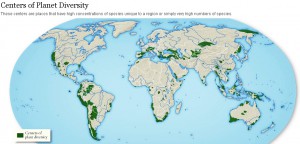The Nature Conservancy is publishing an Atlas of Global Conservation . 1 Some of the maps are online, though not the one below, which I got from a slideshow over at the Washington Post accompanying an article on the atlas.
Why not, though? Surely, if someone is really going to buy the hardcopy version, they are not going to be put off by the fact that all the maps are on the internet. I left a comment to that effect on the Conservancy’s Facebook post announcing the atlas, and they very kindly got back to me saying that more maps will indeed eventually be made available online.
What’s that you say? Any agriculture? A map of centres of crop diversity to go with the above? The list of data sources is not encouraging. But I could be wrong. I’ll keep you posted.
